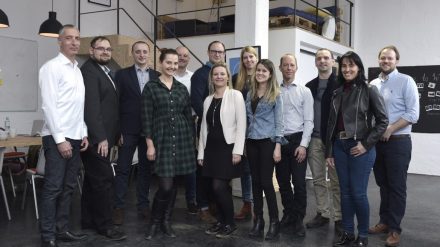The Munich region is one of Germany’s outstanding locations for medical technology — so how is the local digital health branch looking? We wanted to find out about the challenges and opportunities in the Munich startup scene, the state of the local ecosystem and about expert advice for eHealth startups.
With 19,000 people employed by 350 companies, the medtech industry generates an annual turnover of 4.1 million euros (as of 2015 according to a study by the City of Munich). Munich-based medical technology is also a major driver of innovation. Roughly one fourth of the city’s companies, suppliers and service providers were founded after the turn of the century. So how important is the field of digital healthcare in particular?
Digital healthcare – the framework
Digital health refers to the basic use of digital technology in healthcare and also includes the term telemedicine (which is often used in Germany) and eHealth. Digital health aims to improve administrative processes in the healthcare industry as well as the doctor-patient relationship. That includes communication between doctors and patients as well as assistance in preventive care, diagnosis and treatment. It aims to address general healthcare, meaning patient and nursing care, but also the pharmaceutical and insurance industries. The main focus is on two key technologies: One is Big Data and the recording of data. The other is artificial intelligence (AI) and use of data.
Opportunities
EHealth offers benefits for patients, doctors, healthcare providers and also for society as a whole. It could help to improve the quality of healthcare. Also, efficiency and transparency could increase. And a more efficient healthcare system could cut costs even further. Treatments could be faster and more focused and administration could be more efficient.
“Telemedicine in particular shows great potential for leveraging considerable efficiency reserves. It begins with faster and more transparent data transmission and ends with online office hours using chat and video options,”
said Dr. Thomas Rudolf, member of the board of Oberender. Teleclinic, a Munich startup, already offers video and chat appointments. Sebastian Hilke, project manager at Medical Valley EMN e.V., also explained:
“Reflecting on what is known as the ban on remote treatment for model projects in Baden-Wuerttemberg and the […] partial lifting of the ban in Germany by the German Medical Association are significant milestones for moving this issue forward.”
The planned introduction of electronic patient records across Germany in 2021 will also give a further boost, said the expert.

Particularly with long-term illnesses that are expensive to treat, digitization provides significant advantages. Patients are also very open to having improved medical care thanks to digitization, especially when dealing with chronic illnesses, said Konstantin Mehl, founder of Kaia Health, an app that aims to help treat chronic back pain. Opportunities also arise from the changing roles of those involved, commented Dr. Thomas Rudolf:
“Telemedicine and eHealth make the patient more confident. […] The doctor will be more of a guide for a patient through the healthcare system and less of a demigod in white and the sole holder of knowledge.”
At the same time, highly innovative startups are showing major potential in the radically changing market. Jochen Hurlebaus, project manager and Head of Innovation & IP Management at Roche Diagnostics, said:
“The strong demand for digital health solutions and the high degree of specialization are a clear advantage: Startups with the right idea as well as medical and technical expertise have little competition to worry about.”
Trust as a key factor

One thing is necessary to seize the opportunities in the field of healthcare in particular: trust. You need to “get people on board” with the development of digital healthcare solutions. Gaining the people’s trust in innovation, technology and data protection is pivotal for it all being accepted. The major challenge is that administration, doctors and patients all need to demonstrate that trust. Before that, you have the question concerning the needs and discernable benefits, which is then followed by the question as to how society can be involved in new developments. And that also affects those who are meant to actively use the new tools. Maria Driesel, founder and CEO of Inveox, commented:
“It’s often not very easy to get the broad base of the medical community enthusiastic about new, digital solutions. That’s why innovative doctors are of particular importance as well-connected and active trailblazers of the ‘digital healthcare transformation.’ They’re laying an important basis for optimal patient orientation and the future viability of their institutions.”
Another helpful and important factor is setting standards for digital healthcare to establish credibility among insurance companies, patients and doctors, said Konstantin Mehl of Kaia Health, and added:
“That, for example, is why we’re a member of the Digital Therapeutics Alliance. Here it’s all about putting the heads of the leading digital healthcare companies together to figure out where we want to go as an industry!”
One thing is certain for him: Digital treatments need to have the same clinical evidence as any other treatment. That fosters trust.
Challenges like data protection
Trust also plays a role in one of the major challenges faced by eHealth: data protection. Trust, data protection and big data analysis are inseparable. Veronika Schweighart, founder of Climedo Health, mentioned as an example:
“The lack of IT affinity among the majority of decision makers in the healthcare market leads to cloud storage still being viewed as dangerous instead of a major opportunity, even though it fulfills all of the data protection requirements. That seriously hinders the use of AI.”
The advantages provided by the analysis of structured databases are not currently being used to their full potential. The physician Dr. Dominik Pförringer put it in a nutshell:
“From my perspective, data protection protects patients from receiving optimal treatment. In other words: Data protection primarily serves healthy individuals. The moment an illness or problem comes up, every person involved instantly wants immediate access to an amount of data that is as broad and rich as possible, which gives them relevant information.”
The goal should therefore be anonymization without real names and without traceability while also securing the highest possible data integrity.
Torture or stumbling blocks: regulation and venture capital
Everyone also agrees on the second point in terms of challenges: Agile startups and the sluggish German healthcare system are having problems with each other right now. Regulatory frameworks in Germany are torture for startups. That’s because the requirements placed on medical products (key word: CE marking) are stringent. As a result, a startup needs to be very patient and have substantial financial reserves until receiving approval. Another factor specifically in this industry is access to venture capital, which can be difficult. In Munich, however, there’s a network by the name of Angels4Health, which is where business angels with a focus on healthcare and life science have come together. Startups can meet angels at events like the Munich Investment Forum.
Another stumbling block is that startups often lack knowledge of the healthcare sector – be it regarding the best way to achieve approval or insurance companies’ compensation models. Dr. Dominik Pförringer explained:
“Many innovative approaches cannot be accommodated by the existing fee systems (yet), which means they are not appropriately remunerated. In this situation, legislation is in a position to offer a new approach.”
Accessing that specific industry expertise is often the biggest challenge that startups face. But Munich-based eHealth in particular does offer many options for obtaining that very knowledge.
Option 1 – Entering the German market through cooperation
So what needs to happen for digital startups to have an easier time in the German market? How should the transformation be structured? Cooperation is an important keyword. And in this case, just like in all other industries, a silo mentality and stand-alone solutions are no longer viable. Jochen Hurlebaus, who is also a mentor at the Digital Health Accelerator, said:
“To successfully pave the way for healthcare of the future, it’s important for different players with different strengths to work together.”
While established companies have a lot of expertise to offer – such as in the field of regulatory requirements – that startups lack, it’s the startups that have the dynamics and new ideas that are necessary to develop digital solutions. Startups’ agility and distinct customer focus are what add value.

The focus might be on more specific target groups such as hospitals or doctors’ offices. It could also be on solutions that immediately solve problems and pay off instantly. Due to our particular German healthcare system, an increasing number of startups are also looking to secure partnerships with insurance companies. An alternative is focusing on occupational healthcare or offering end customers solutions directly.
Option 2 – Networking: Munich and its eHealth scene
So how is Munich positioned in the world of digital healthcare? ‘Better than you think,’ ‘unbeatable ecosystem,’ ‘an outstanding international reputation’ and ‘growing’ were the responses from our interview partners. Dr. Dominik Pförringer even said:
“In my view, Munich along with Medical Valley Erlangen is developing into Germany’s stronghold for medical innovation. There really is an optimistic, gold rush kind of atmosphere in the Bavarian eHealth scene at the moment.”
There are several good reasons for its strength: On the one hand, the city has an accumulation of strong medtech companies combined with pharmaceutical companies and technology corporations such as Google, Microsoft and IBM. On the other hand, there are university structures from the Technical University and Ludwig Maximilian University as well as their medical and medicine-related departments and startup promotion programs. In recent years, the Digital Health Accelerator and InsurTech Accelerator have developed in conjunction with Werk1. That happened together with the internationally distinguished accelerator Plug & Play, which focuses on health and insurance in Munich. Last but not least, companies are also benefitting from the Bavarian digitization strategy and the support it offers. An example is the Medical Valley Award, which was created as a pre-seed competition to promote the industry. The Forum MedTech Pharma also offers support and networking options.
Option 3 – Learn from others: hands-on tips
Above we drew attention to how and, more specifically, where startups can network with and learn from one another. But we also want to give some concrete tips. Two startups shared their specific advice. Dominik Sievert, co-founder of Inveox, particularly mentioned the “Digital Health Accelerator” of Roche and Plug&Play, which they were able to participate in as part of the first batch. That was where the startup greatly benefitted from mentoring, industry insights and the network above all else, said the founder:
“In the Digital Health Accelerator, selected startups are given valuable momentum and a lot of business know-how.”
The Garching-based founder and technology center gate is an excellent location for Inveox, because it is where there has been a particularly encouraging increase in medtech startups, including Terraplasma, dynamify and Vision Health. Other helpful opportunities are provided by networking events by the biotech cluster BioM in Martinsried, events such as the Healthcare Innovation Forum or the Digital Health Entrepreneurship Meetup, which is held regularly. The meetup is particularly suitable for an informal exchange of ideas. In addition to the option of making a short pitch, it simply gives startups an opportunity to share advice or openly establish contact with other players.
Dr. Johannes Kreuzer, founder of cosinuss, addressed the topic of patience and financing: He bridged the long period of time until receiving approval as a medical product by having his startup directly develop a B2C product while also completing contract work for companies. His advice as a result: Business models that don’t run based on a medical product. Or business models that can be immediately listed on the health insurance companies’ list of technical aids.
Dominic Niebler, startup consultant at Barmer Krankenkasse in Munich, added:
“Since there are hardly any paths leading to collective care, insurance companies can support promising startups by using individual selective contracts or cooperative prevention projects. That also allows us to generate evidence about the efficacy of those treatments, which helps to facilitate startups’ market entry.”
That being said, insurance companies have a very tight budget for cooperation like with the Munich startup Kaia Health. That’s why the consultant tries to support startups with expertise to make it easier for them to find their way through the “regulatory jungle of the German healthcare system.”
Munich: “Germany’s stronghold for medical innovation”
The digital health scene is undergoing major change in Munich. Networking has improved compared to a few years ago, because now there are accelerators in addition to informal meetups. The individual players are also more visible now, which means supporters can be contacted directly. There are also so many successful Munich startups in the field, that we weren’t able to list them all in one article.
So what is needed for the Munich digital health scene to continue to grow so well? Of all the factors mentioned above, there’s one in particular: cooperation between the different players and pooling expertise from the medical world with the knowledge from IT and digitization. Dr. Pförringer also has a wonderful vision:
“My ideal vision is of a digital medical center for promoting development, teaching, spin-offs and subsequent incubation.”
We’re just as interested to see how the Munich eHealth scene will develop in the future and which exciting new startups we’ll discover along the way. If you would like to learn more: With our keywords such as health, eHealth or digital health, you’ll find many additional articles about health startups and relevant dates in the industry. Even more insights are provided in the “Digital Medicine” Special by BayStartUP.



